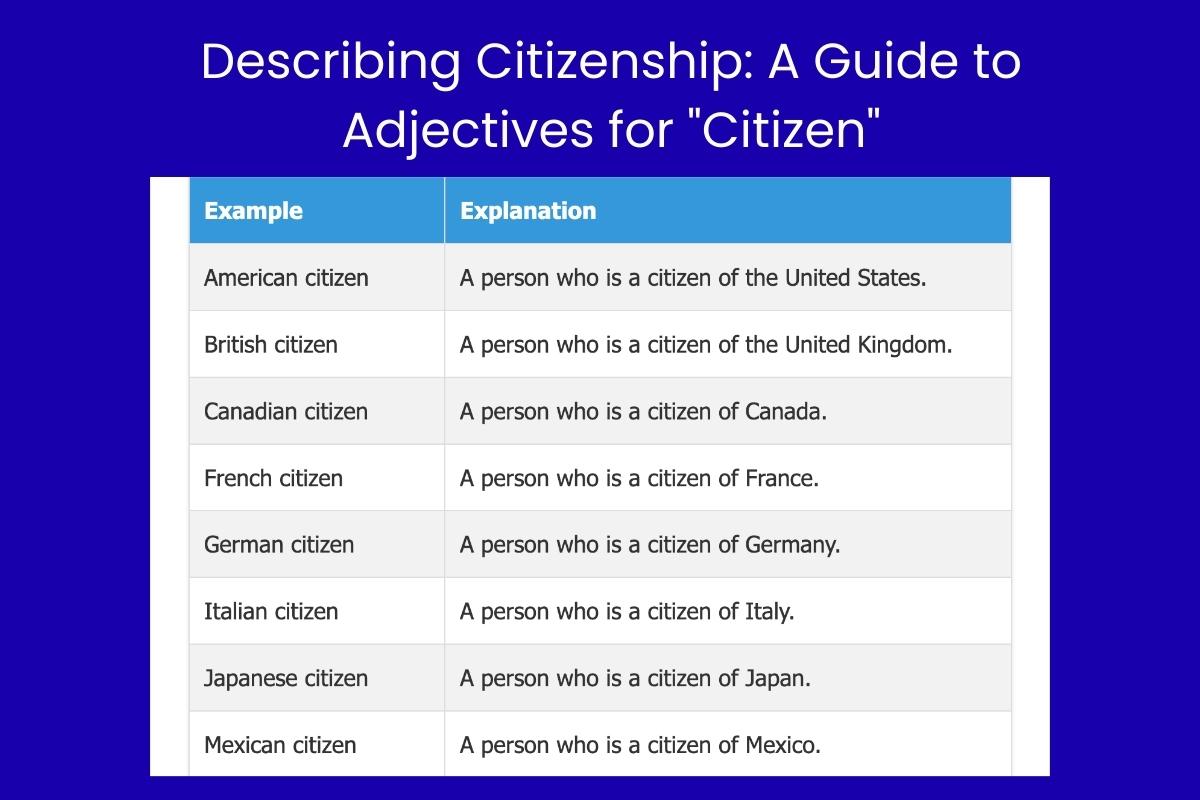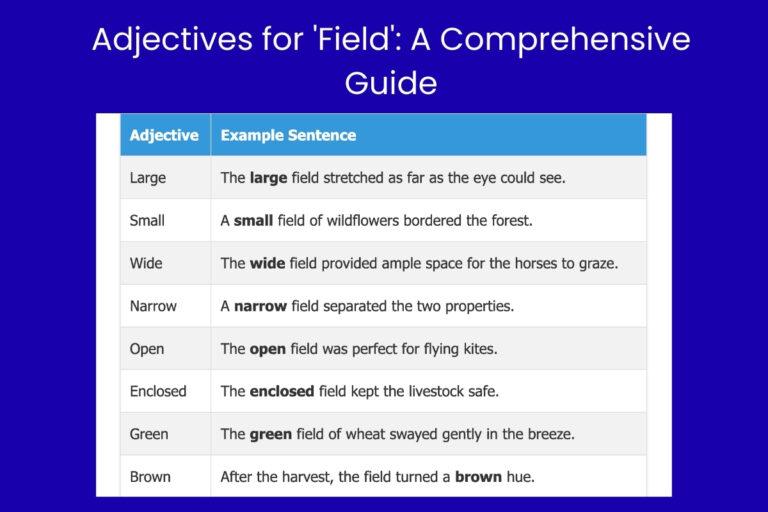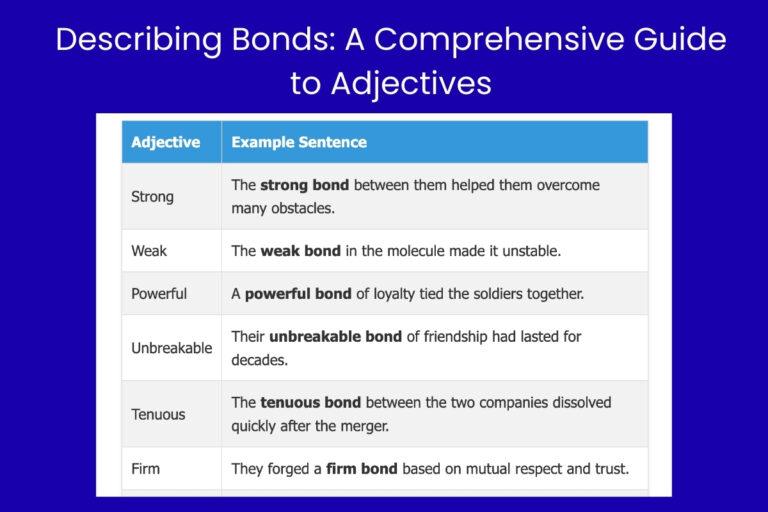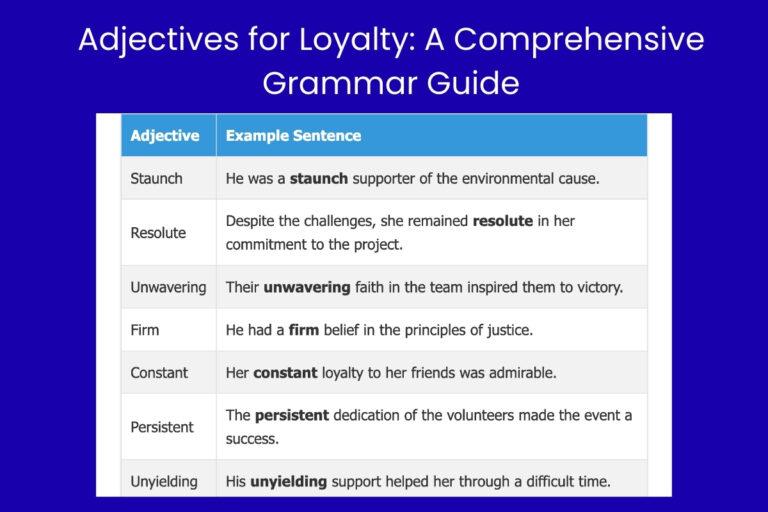Describing Citizenship: A Guide to Adjectives for “Citizen”
Understanding how to describe citizenship using adjectives is crucial for expressing nuanced perspectives and conveying precise information. In English grammar, adjectives modify nouns, adding detail and specificity. When discussing citizens, the right adjectives can highlight their rights, responsibilities, origins, or characteristics. This article explores a wide range of adjectives applicable to “citizen,” providing examples, usage rules, and practice exercises to help you master this aspect of English grammar. Whether you’re an English language learner, a student, or simply someone looking to improve their writing, this guide will equip you with the tools to describe citizens effectively.
This comprehensive guide covers everything from basic definitions to advanced usage, ensuring a thorough understanding of adjectives for “citizen.” We will delve into various categories of adjectives, provide numerous examples, and address common mistakes. By the end of this article, you’ll be able to confidently select and use the most appropriate adjectives to describe citizens in any context.
Table of Contents
- Introduction
- Definition of Adjective for “Citizen”
- Structural Breakdown
- Types of Adjectives for “Citizen”
- Examples of Adjectives for “Citizen”
- Usage Rules
- Common Mistakes
- Practice Exercises
- Advanced Topics
- FAQ
- Conclusion
Definition of Adjective for “Citizen”
An adjective is a word that modifies a noun or pronoun, providing more information about it. When used with the noun “citizen,” adjectives describe qualities, characteristics, or attributes of that citizen. These adjectives can specify nationality, legal status, civic responsibilities, or personal traits relevant to their role as a citizen. The function of these adjectives is to add detail and context, allowing for a more precise and nuanced understanding of the individuals being discussed.
The term “citizen” itself refers to a legally recognized member of a state or nation, whether native or naturalized. Therefore, adjectives modifying “citizen” often relate to legal or national affiliations. However, they can also describe a citizen’s behavior, rights, or responsibilities within their community or country. The choice of adjective depends heavily on the specific context and the intended meaning.
For example, consider the difference between “American citizen” and “responsible citizen.” The first specifies nationality, while the second describes a positive behavioral trait. Both are valid uses of adjectives with “citizen,” but they convey very different information. Understanding this distinction is key to using adjectives effectively.
Structural Breakdown
The structure of adjective use with “citizen” is relatively straightforward. Typically, the adjective precedes the noun “citizen.” This is the standard word order in English for descriptive adjectives. However, in some cases, multiple adjectives might be used, following general rules of adjective order (e.g., opinion, size, age, shape, color, origin, material, type, purpose).
Consider the phrase “a law-abiding citizen.” Here, “law-abiding” is a compound adjective describing the citizen’s behavior. The hyphen connects the two words, creating a single adjectival unit. Compound adjectives are common when describing complex characteristics. Another example is “a tax-paying citizen“.
In cases where multiple adjectives are used, the order usually follows a conventional pattern. For instance, you might say “a responsible, young citizen,” where “responsible” is a general opinion and “young” describes the citizen’s age. The order isn’t always rigid, but adhering to general guidelines improves clarity and naturalness.
Here’s a breakdown of the typical structure:
- Single Adjective: [Adjective] + citizen (e.g., loyal citizen)
- Compound Adjective: [Compound Adjective] + citizen (e.g., hard-working citizen)
- Multiple Adjectives: [Adjective 1], [Adjective 2] + citizen (e.g., dedicated, informed citizen)
Types of Adjectives for “Citizen”
Adjectives used to describe “citizen” can be categorized based on the type of information they convey. Here are some key categories:
Nationality Adjectives
These adjectives specify the citizen’s country of origin or allegiance. They are among the most common adjectives used with “citizen.” Examples include American, British, Canadian, French, German, Italian, Japanese, Mexican, and Russian.
Nationality adjectives are crucial for identifying a citizen’s national affiliation, which can be relevant in various legal, political, and social contexts. They provide essential information about a person’s background and rights within a particular country.
Legal Status Adjectives
These adjectives describe the citizen’s legal standing within a country. Examples include naturalized, dual, resident, and non-resident. These adjectives clarify the specific rights and responsibilities a citizen holds.
Understanding a citizen’s legal status is vital for determining their eligibility for certain benefits, their obligations under the law, and their ability to participate in political processes. These adjectives provide important details about a citizen’s relationship with the state.
Descriptive Adjectives
These adjectives describe the citizen’s characteristics, behavior, or qualities. Examples include responsible, law-abiding, active, engaged, informed, and patriotic. These adjectives provide insight into a citizen’s role and contributions to society.
Descriptive adjectives offer a more nuanced understanding of a citizen’s impact on their community. They can highlight positive qualities that contribute to a healthy society or, conversely, negative traits that detract from it. The choice of descriptive adjective often reflects a particular viewpoint or value judgment.
Rights-Based Adjectives
These adjectives relate to the rights that a citizen possesses. Examples include voting, enfranchised, and disenfranchised. They highlight the citizen’s ability to participate in the democratic process and enjoy legal protections.
Rights-based adjectives are particularly important in discussions of civil liberties and political participation. They draw attention to the fundamental rights that are guaranteed to citizens and the ways in which those rights can be exercised or denied.
Duty-Related Adjectives
These adjectives describe the obligations and responsibilities that a citizen has towards their country or community. Examples include tax-paying, jury-eligible, and conscripted (if applicable). These adjectives emphasize the reciprocal relationship between citizens and the state.
Duty-related adjectives underscore the idea that citizenship is not just about enjoying rights but also about fulfilling certain obligations. These obligations are essential for the functioning of a society and the maintenance of its institutions.
Examples of Adjectives for “Citizen”
To illustrate the different types of adjectives used with “citizen,” here are several examples organized by category.
Nationality Adjective Examples
The following table provides examples of nationality adjectives used with “citizen.”
| Example | Explanation |
|---|---|
| American citizen | A person who is a citizen of the United States. |
| British citizen | A person who is a citizen of the United Kingdom. |
| Canadian citizen | A person who is a citizen of Canada. |
| French citizen | A person who is a citizen of France. |
| German citizen | A person who is a citizen of Germany. |
| Italian citizen | A person who is a citizen of Italy. |
| Japanese citizen | A person who is a citizen of Japan. |
| Mexican citizen | A person who is a citizen of Mexico. |
| Russian citizen | A person who is a citizen of Russia. |
| Australian citizen | A person who is a citizen of Australia. |
| Chinese citizen | A person who is a citizen of China. |
| Indian citizen | A person who is a citizen of India. |
| Brazilian citizen | A person who is a citizen of Brazil. |
| Spanish citizen | A person who is a citizen of Spain. |
| Swiss citizen | A person who is a citizen of Switzerland. |
| Dutch citizen | A person who is a citizen of the Netherlands. |
| Swedish citizen | A person who is a citizen of Sweden. |
| Norwegian citizen | A person who is a citizen of Norway. |
| Danish citizen | A person who is a citizen of Denmark. |
| Irish citizen | A person who is a citizen of Ireland. |
| Polish citizen | A person who is a citizen of Poland. |
| Greek citizen | A person who is a citizen of Greece. |
| Portuguese citizen | A person who is a citizen of Portugal. |
| Argentinian citizen | A person who is a citizen of Argentina. |
| South African citizen | A person who is a citizen of South Africa. |
These examples demonstrate how nationality adjectives are used to specify a citizen’s country of origin or allegiance. They are essential for providing context and clarity in discussions about citizenship.
Legal Status Adjective Examples
The following table provides examples of legal status adjectives used with “citizen.”
| Example | Explanation |
|---|---|
| Naturalized citizen | A person who was not born a citizen but has become one through a legal process. |
| Dual citizen | A person who holds citizenship in two countries. |
| Resident citizen | A citizen who resides in a particular country. |
| Non-resident citizen | A citizen who does not reside in their country of citizenship. |
| Full citizen | A citizen who possesses all the rights and privileges of citizenship. |
| Conditional citizen | A citizen whose citizenship is subject to certain conditions or requirements. |
| Honorary citizen | A person who has been granted citizenship as an honor, often without the usual rights. |
| Overseas citizen | A citizen who lives abroad. |
| Registered citizen | A citizen who is registered with the government. |
| Eligible citizen | A citizen who is eligible for certain rights or benefits. |
| Ineligible citizen | A citizen who is not eligible for certain rights or benefits. |
| Voting citizen | A citizen who is eligible to vote. |
| Non-voting citizen | A citizen who is not eligible to vote. |
| Tax-paying citizen | A citizen who pays taxes. |
| Law-abiding citizen | A citizen who obeys the law. |
| Former citizen | A person who was previously a citizen but no longer is. |
| Potential citizen | A person who is eligible to become a citizen. |
| New citizen | A person who has recently become a citizen. |
| Immigrant citizen | A citizen who immigrated to the country. |
| Native-born citizen | A citizen who was born in the country. |
| Adopted citizen | A citizen who was adopted. |
| Qualified citizen | A citizen who is qualified for certain roles or responsibilities. |
| Disqualified citizen | A citizen who is disqualified from certain roles or responsibilities. |
| Registered citizen | A citizen who is registered with the government. |
| Unregistered citizen | A citizen who is not registered with the government. |
These examples highlight the importance of legal status adjectives in clarifying a citizen’s specific rights and responsibilities within a country.
Descriptive Adjective Examples
The following table provides examples of descriptive adjectives used with “citizen.”
| Example | Explanation |
|---|---|
| Responsible citizen | A citizen who acts in a responsible and ethical manner. |
| Law-abiding citizen | A citizen who obeys the laws of the country. |
| Active citizen | A citizen who actively participates in civic life. |
| Engaged citizen | A citizen who is involved in their community and political processes. |
| Informed citizen | A citizen who is knowledgeable about current events and issues. |
| Patriotic citizen | A citizen who loves and is devoted to their country. |
| Good citizen | A citizen who contributes positively to society. |
| Concerned citizen | A citizen who is worried about issues affecting their community or country. |
| Model citizen | A citizen who exemplifies the best qualities of citizenship. |
| Loyal citizen | A citizen who is faithful to their country and its values. |
| Dedicated citizen | A citizen who is committed to their community and country. |
| Vigilant citizen | A citizen who is watchful and aware of issues affecting their community. |
| Thoughtful citizen | A citizen who considers the impact of their actions on others. |
| Contributing citizen | A citizen who makes positive contributions to society. |
| Valuable citizen | A citizen who is considered an asset to their community. |
| Respectful citizen | A citizen who shows respect for others and for the law. |
| Honest citizen | A citizen who is truthful and trustworthy. |
| Diligent citizen | A citizen who is hardworking and conscientious. |
| Compassionate citizen | A citizen who is empathetic and caring towards others. |
| Altruistic citizen | A citizen who is selfless and concerned for the well-being of others. |
| Civic-minded citizen | A citizen who is interested in and involved in civic affairs. |
| Public-spirited citizen | A citizen who is dedicated to the public good. |
| Engaged citizen | A citizen who actively participates in their community and political processes. |
| Involved citizen | A citizen who is involved in civic activities. |
| Participating citizen | A citizen who participates in community events and activities. |
These examples illustrate how descriptive adjectives can provide a more nuanced understanding of a citizen’s character, behavior, and contributions to society.
Rights-Based Adjective Examples
The following table provides examples of rights-based adjectives used with “citizen.”
| Example | Explanation |
|---|---|
| Voting citizen | A citizen who has the right to vote in elections. |
| Enfranchised citizen | A citizen who has been granted the right to vote. |
| Disenfranchised citizen | A citizen who has been deprived of the right to vote. |
| Protected citizen | A citizen whose rights are protected by law. |
| Equal citizen | A citizen who is entitled to equal rights and opportunities. |
| Free citizen | A citizen who enjoys freedom of speech, assembly, and other rights. |
| Empowered citizen | A citizen who has the knowledge and resources to exercise their rights. |
| Represented citizen | A citizen who is represented by elected officials. |
| Unrepresented citizen | A citizen who is not represented by elected officials. |
These examples emphasize the importance of rights-based adjectives in discussions of civil liberties and political participation.
Duty-Related Adjective Examples
The following table provides examples of duty-related adjectives used with “citizen.”
| Example | Explanation |
|---|---|
| Tax-paying citizen | A citizen who fulfills their obligation to pay taxes. |
| Jury-eligible citizen | A citizen who is eligible to serve on a jury. |
| Conscripted citizen | A citizen who is required to serve in the military (in countries with conscription). |
| Serving citizen | A citizen who is actively serving their country or community. |
| Law-abiding citizen | A citizen who adheres to the laws and regulations of their country. |
| Responsible citizen | A citizen who fulfills their responsibilities to their community and country. |
These examples underscore the reciprocal relationship between citizens and the state, highlighting the duties and obligations that come with citizenship.
Usage Rules
When using adjectives with “citizen,” it’s important to follow standard English grammar rules. Here are some key rules to keep in mind:
- Adjective Placement: Adjectives typically precede the noun they modify. For example, “a responsible citizen.”
- Multiple Adjectives: When using multiple adjectives, follow the general order of adjectives: opinion, size, age, shape, color, origin, material, type, purpose. For example, “a dedicated, young citizen.”
- Compound Adjectives: Use hyphens for compound adjectives that precede the noun. For example, “a law-abiding citizen.”
- Articles: Use the appropriate article (a, an, or the) based on the adjective and the context. For example, “a naturalized citizen,” “an engaged citizen,” “the responsible citizen.”
- Context: Choose adjectives that are relevant and appropriate for the context. Consider the specific information you want to convey about the citizen.
It’s also important to be mindful of the connotations of the adjectives you use. Some adjectives, like “patriotic,” can be interpreted differently depending on the context and the audience. Choose adjectives that accurately reflect your intended meaning and avoid those that could be misconstrued.
Common Mistakes
Here are some common mistakes to avoid when using adjectives with “citizen”:
| Incorrect | Correct | Explanation |
|---|---|---|
| Citizen American | American citizen | Adjectives usually precede the noun in English. |
| A responsible, active, citizen | A responsible, active citizen | Avoid unnecessary commas before the noun. |
| Citizen law-abiding | Law-abiding citizen | Adjectives usually precede the noun in English. |
| An responsible citizen | A responsible citizen | Use “a” before consonant sounds, not “an.” |
| Good citizen, responsible | Responsible, good citizen | Follow the general order of adjectives. |
Avoiding these common mistakes will improve the clarity and accuracy of your writing.
Practice Exercises
Test your understanding with these practice exercises.
Exercise 1: Identifying Adjectives
Identify the adjective(s) describing the citizen in each sentence.
| Question | Answer |
|---|---|
| 1. The naturalized citizen was proud to vote. | naturalized |
| 2. The responsible citizen always pays their taxes on time. | responsible |
| 3. The active citizen volunteered at the local community center. | active |
| 4. The patriotic citizen waved the flag during the parade. | patriotic |
| 5. The informed citizen always reads the news. | informed |
| 6. The law-abiding citizen followed all traffic rules. | law-abiding |
| 7. The British citizen traveled abroad. | British |
| 8. The concerned citizen attended the town hall meeting. | concerned |
| 9. The dual citizen held passports from two countries. | dual |
| 10. The tax-paying citizen contributed to the economy. | tax-paying |
Exercise 2: Choosing the Right Adjective
Choose the best adjective to complete each sentence.
| Question | Options | Answer |
|---|---|---|
| 1. The ______ citizen was born in Canada. | (a) naturalized, (b) Canadian, (c) responsible | (b) Canadian |
| 2. The ______ citizen always obeys the law. | (a) active, (b) law-abiding, (c) voting | (b) law-abiding |
| 3. The ______ citizen is eligible to vote in elections. | (a) naturalized, (b) resident, (c) voting | (c) voting |
| 4. The ______ citizen has the right to hold two passports. | (a) dual, (b) serving, (c) patriotic | (a) dual |
| 5. The ______ citizen takes part in community events. | (a) active, (b) tax-paying, (c) conscripted | (a) active |
| 6. The ______ citizen contributes to society through taxes. | (a) naturalized, (b) tax-paying, (c) honorary | (b) tax-paying |
| 7. The ______ citizen is devoted to their country. | (a) concerned, (b) informed, (c) patriotic | (c) patriotic |
| 8. The ______ citizen is worried about environmental issues. | (a) concerned, (b) loyal, (c) diligent | (a) concerned |
| 9. The ______ citizen is hardworking and conscientious. | (a) responsible, (b) diligent, (c) honorary | (b) diligent |
| 10. The ______ citizen was granted citizenship as an honor. | (a) naturalized, (b) registered, (c) honorary | (c) honorary |
Exercise 3: Sentence Completion
Complete each sentence with an appropriate adjective to describe the citizen.
| Question | Answer (Example) |
|---|---|
| 1. The ______ citizen volunteered their time at the homeless shelter. | Compassionate |
| 2. The ______ citizen always stays updated on current events. | Informed |
| 3. As a ______ citizen, she felt it was her duty to vote. | Responsible |
| 4. The ______ citizen proudly displayed their country’s flag. | Patriotic |
| 5. The ______ citizen contributed significantly to the local economy. | Tax-paying |
| 6. The ______ citizen was called for jury duty. | Jury-eligible |
| 7. The ______ citizen was born in France but now lives in the US. | French |
| 8. The ______ citizen always follows the rules and regulations. | Law-abiding |
| 9. After years of residency, he became a ______ citizen. | Naturalized |
| 10. The ______ citizen actively participated in community meetings. | Engaged |
Advanced Topics
For advanced learners, consider exploring the nuances of adjective usage in political discourse and legal contexts. The choice of adjective can significantly impact how a citizen is perceived and treated. For example, the term “illegal citizen” is often used controversially, as it conflates immigration status with citizenship. Analyzing the rhetorical effects of different adjectives can provide a deeper understanding of the power of language.
Another advanced topic is the study of how adjectives related to citizenship evolve over time. As societies change, so too do the qualities and characteristics that are valued in citizens. Examining historical texts can reveal how the meaning and usage of adjectives like “loyal,” “patriotic,” and “responsible” have shifted over the centuries.
Finally, consider the cross-cultural variations in the concept of citizenship and the adjectives used to describe it. Different countries and cultures may have different expectations of their citizens, and this is reflected in the language they use. Comparing the adjectives used in different languages can provide insights into the diverse ways in which citizenship is understood around the world.
FAQ
- What is the correct order of adjectives when describing a citizen?
The general order of adjectives in English is: opinion, size, age, shape, color, origin, material, type, purpose. For example, “a responsible, young citizen.” However, this order is not always rigid, and you can adjust it for clarity and emphasis.
- Can I use multiple adjectives to describe a citizen?
Yes, you can use multiple adjectives to provide a more detailed description. Just make sure to follow the general order of adjectives and use commas to separate them (except for the last adjective before the noun). For example, “an active, engaged, informed citizen.”
- What is a compound adjective, and how do I use it with “citizen”?
A compound adjective is formed when two or more words are joined together to modify a noun. Use a hyphen to connect the words when the compound adjective precedes the noun. For example, “a law-abiding citizen.”
- What is the difference between “naturalized citizen” and “native-born citizen”?
“Naturalized citizen” refers to a person who was not born a citizen but has become one through a legal process. “Native-born citizen” refers to a person who was born a citizen of a particular country.
- Is it correct to say “citizen American” instead of “American citizen”?
No, the correct word order is “American citizen.” In English, adjectives usually precede the noun they modify.
- What are some alternative ways to describe a citizen’s responsibilities without using adjectives?
You can use phrases like “a citizen who fulfills their duties,” “a citizen who contributes to society,” or “a citizen who is committed to their community.”
- How do I choose the most appropriate adjective to describe a citizen in a specific context?
Consider the specific information you want to convey and the connotations of the adjective. Choose an adjective that accurately reflects the citizen’s qualities, characteristics, or legal status, and be mindful of how the adjective might be interpreted by your audience.
- Are there any adjectives that should be avoided when describing a citizen?
Avoid adjectives that are discriminatory, offensive, or based on stereotypes. Be mindful of the potential for misinterpretation and choose adjectives that are respectful and accurate.
Conclusion
Mastering the use of adjectives to describe “citizen” is essential for clear and effective communication. This article has provided a comprehensive overview of different types of adjectives, usage rules, common mistakes, and practice exercises. By understanding these concepts, you can confidently select and use the most appropriate adjectives to describe citizens in various contexts.
Remember to consider the specific information you want to convey, the connotations of the adjectives you use, and the potential for misinterpretation. With practice and attention to detail, you can become proficient in using adjectives to paint a vivid and accurate picture of citizens and their roles in society. Keep practicing, and you’ll find your writing becomes more precise, nuanced, and impactful.
Continue to explore the nuances of English grammar and vocabulary to enhance your communication skills. The ability to describe citizens effectively is just one aspect of a broader understanding of language, but it is a crucial one for anyone seeking to express themselves clearly and accurately.






